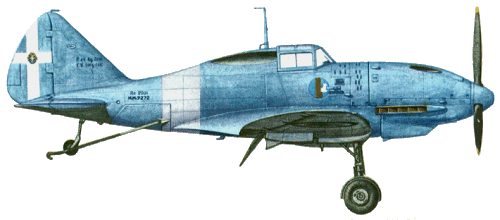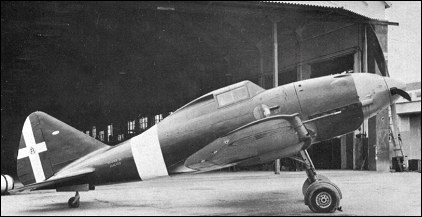|
| Officine Meccaniche Reggiane SA began
development of a single-seat
fighter which was based very closely
on the US Seversky Aircraft Corporation's
P-35 designed by Alexander
Kartveli. Competitive evaluation
against the Macchi MC.200 resulted in
this latter aircraft being ordered into
production for the Regia Aeronautica,
although the Reggiane Re.2000 had
shown itself to be superior in manoeuvrability,
even when flown against the
Messerschmitt Bf 109E. The type was
ordered by the Hungarian government,
which also acquired a manufacturing
licence. Re.2000s were supplied
also to Sweden, being operated until
1945 by the Flygvapen under the designation
J.20. And though rejected by
the Regia Aeronautica, the Italian navy
acquired 12 Re.2000 Serie II fighters
especially strengthened for catapult
launching, followed by 24 Re.2000
Serie III aircraft with increased fuel
capacity for deployment as long-range
fighters.
Installation of the Daimler-Benz DB
601A-1 engine led to the Re.2001 Falco
II, first used operationally by the Regia
Aeronautica over Malta in 1942. Luftwaffe
priorities for DB 601 engines
meant that the Re.2001 had to be powered
by a licence-built version of this
engine, the Alfa Romeo RA.1000 RC
41-la Monsonie, but with the Macchi
MC.202 having first call on production
of these engines the manufacture of
Re.2001s was limited to only 252.

| Alberto Rizzi, e-mail, 26.02.2018 20:23 When the inverted V Daimler-Benz DB 601 became disposable (also manufactured under license) in good quantity, some aeronautical industries mounted this new engine on their radial engine fighters: the FIAT proposed a new C.R. 42 (but stopping its attempt at the prototype phase); Macchi projected the M.C. 202 "Folgore", Caproni-Reggiane the Re. 2001, unofficially called both "Falco II" (Hawk II – to remember it was a modified Re. 2000) and "Ariete I" (Ram I – linking it to the development of the Re. 2002 "Ariete II").
The Regia Aeronautica summit decided the mass production of this aircraft also to prevent a possible failure of the M.C. 202 and it could have totalized a higher number of aircrafts, if not for problems from the lack of experience by Reggiane workers. Despite it had a top speed 30 m.p.h. less than the M.C. 202, the Re. 2001 earned the respect of many Commonwealth pilots over Malta and the Mediterranean Sea (for instance the ace George Beurling), being able to match without problems (except for its armament) against Spit Mk V, Hurricane and P-40.
In my opinion (and apart from the above pictured project for aircraft carriers) the most interesting versions were:
- Re. 2001 CB (Cacciabombardiere = Fighter bomber): 39 built, with ventral attack for 250 Kg. (= 551 lb) bomb; one of them was also tested with a 640 Kg (= 1,410 lb) liquid oxygen bomb: it didn't work (the bomb, not the airplane).
- Re. 2001 CN (Caccia Notturna = Night fighter): 94 built in three series. They had modified exhausts, black under surfaces and 2 x 20 mm. Mauser cannons in underwing nacelles, instead of the 2 x 7,7 mm. machine guns. Despite the primitive state of the night interception in Italy, this "emergency night fighter" caught some success, also when used (lacking other more outstanding machines) in daylight attacks against the Allied bombers.
- Re. 2001G: experimental aircraft for carrying a 600 Kg. (= 1,322 lb) torpedo. reply | | baxie, 20.06.2011 05:21 what the outcome of the war might have been had Italy had these Reggiane fighters in numbers comparable to the Spitfires, Hurricanes and P-40's of their Allied opponents. reply | | Ben Beekman, e-mail, 24.01.2011 22:34 A very important factor in the Mediterranean fighting over places like Sicily and Malta, here are the statistics for the Reggiane Re. 2001 Falco II according to the book by Squadron /Signal Publications, Inc. of 1115 Crowley Drive, Carrolton, Texas 75011-5010 and authored by George Punka:
Wingspan: 36 ft. 1 inch
Length: 28 ft. 3 inches
Ht.: 10 ft. 4 inches
Empty Weight: 5423.3 lbs.
Max. Wt.: 7142.9 lbs.
Powerplant: 1 x 1,175 hp. Alfa Romeo RA 1000 R.C. 41-1a "Monsonie", 12-cylinder, liquid cooled, inverted-Vee, inline engine.
Armament: Two cowl-mounted 12.7 mm Breda-SAFAT mg's with 350 rounds per gun and two wing-mounted 7.7 mm Breda-SAFAT mg's with 600 rounds per gun.
Maximun Speed: 338.7 mph at 17,946.2 ft.
Service Ceiling: 36,089.2 ft.
Maximum Range: 683.5 miles at 291.4 mph and 19,685 ft.
Crew: One
First flight of the Falco II was on July 14, 1940 by test pilot Mario de Bernardi. After only 252 Re.2001's were built at Reggiane's factory at Regio Emilia, the plant was destroyed in an Allied air raid. The Regia Aeronautica had only 71 servicable Re. 2001's left when the Allies invaded Sicily on July 10, 1943 and only 33 operational at the armistice on Sept. 8, 1943. The Re. 2001 was to be succeeded by the Re. 2002 "Ariete", very similar in appearance but using an 1,175 hp Piaggio radial engine and designed for ground attack. About 225 were built with the Germans taking some of them for their own use after the armistice. An excellent combat airplane, we can only imagine what the outcome of the war might have been had Italy had these Reggiane fighters in numbers comparable to the Spitfires, Hurricanes and P-40's of their Allied opponents. reply | | Salvatore Pizzo, e-mail, 27.04.2010 09:02 I love this plane. To me, it is the most graceful and beautiful WWII plane. reply | |
| | ALVAMA, e-mail, 04.12.2009 19:06 Yea looks like a Carrier version for on the Never-finnist carrier Aquila for the Regia Marina. reply | | Jacky, e-mail, 16.08.2008 13:22 If you want to see a Reggiane(without wings)there is one in the Musée de la resistance of Limoges France.It was display outside in a public garden during a long time,restaured by French armée de l'air. reply | | Sgt.KAR98, 03.07.2008 04:53 I liked this painting,from Regia Marina I suppose? reply |
|
Do you have any comments?
|
| 
COMPANY
PROFILE
All the World's Rotorcraft
|







